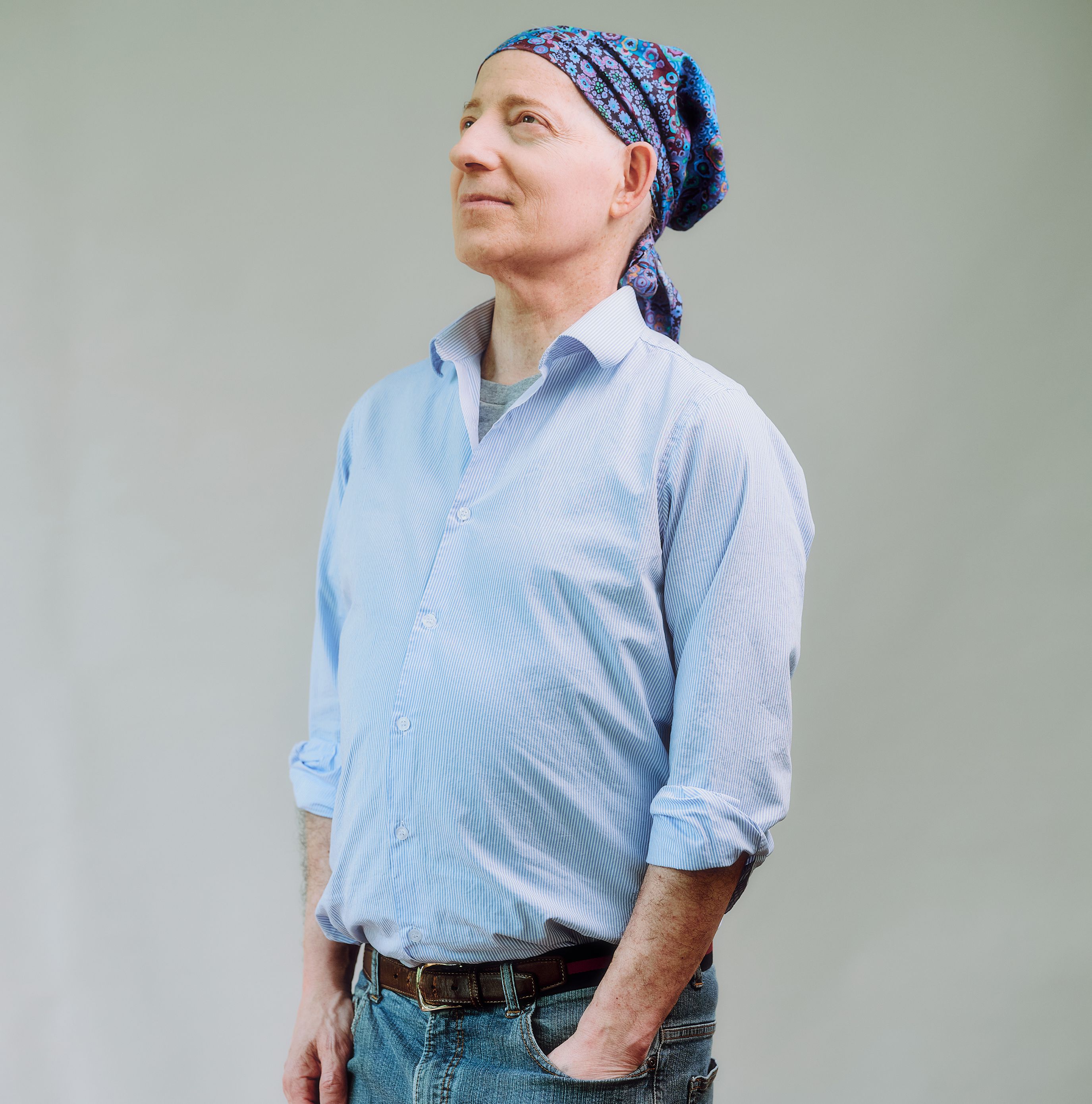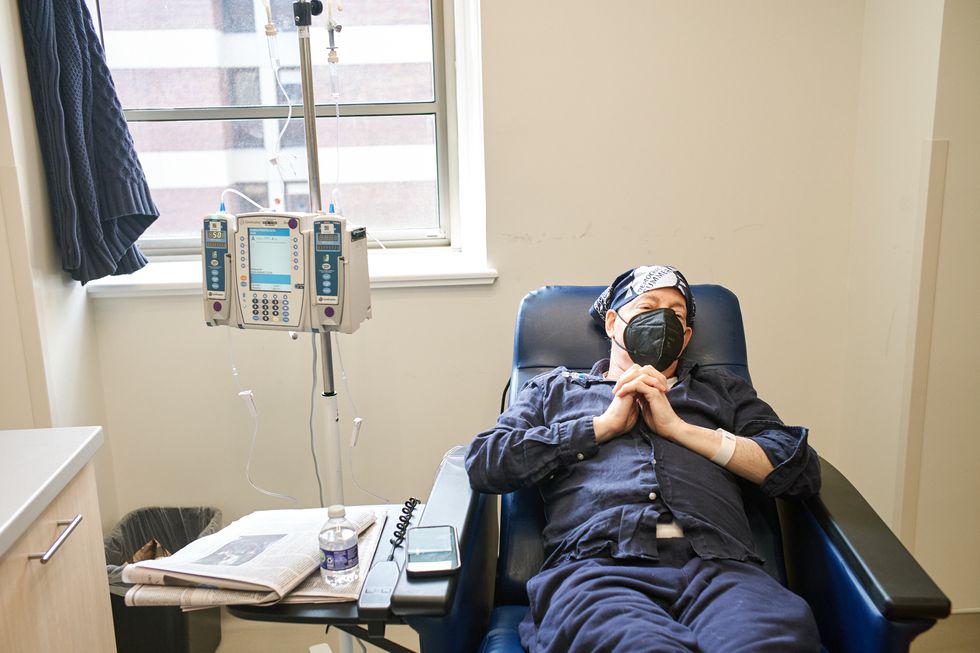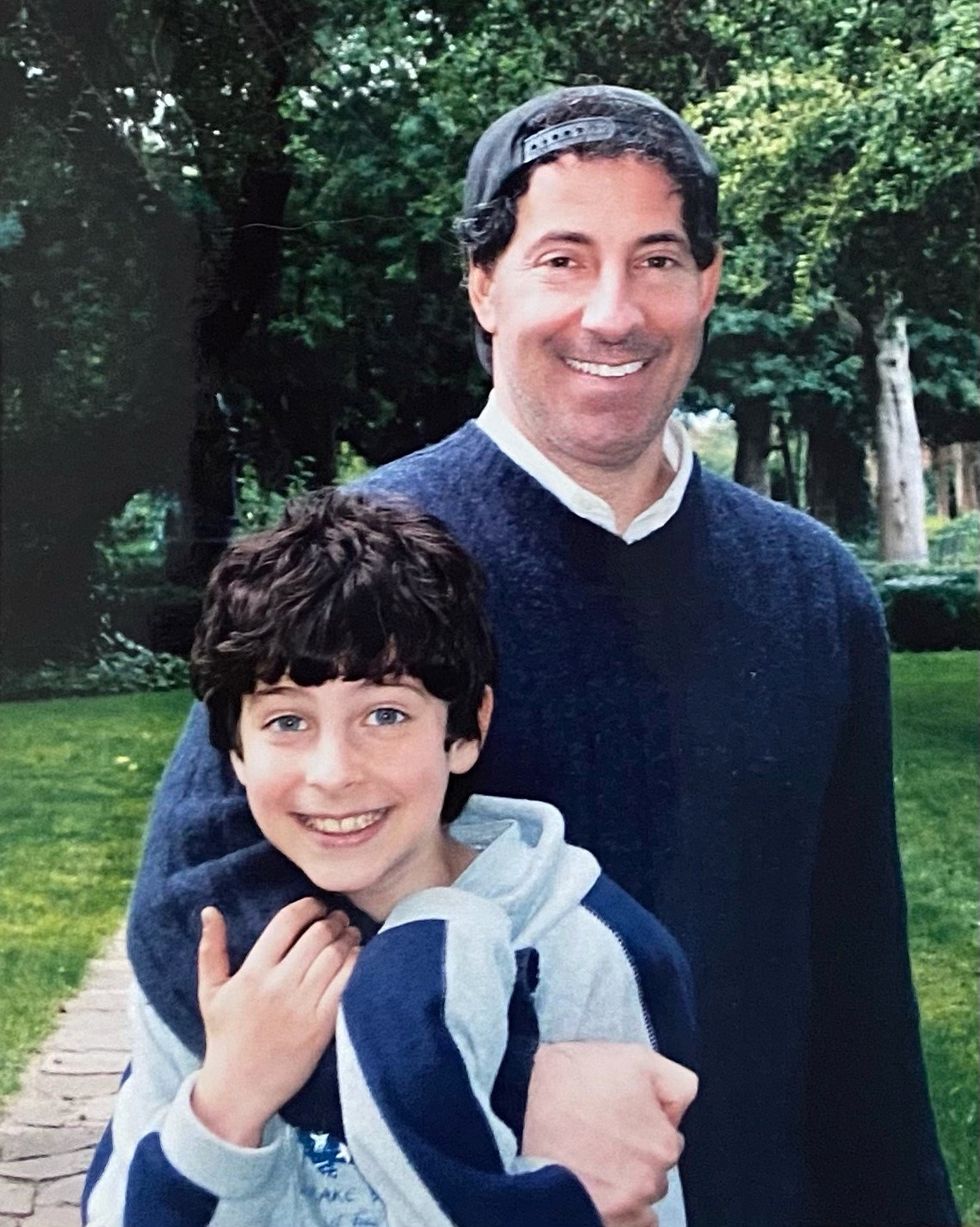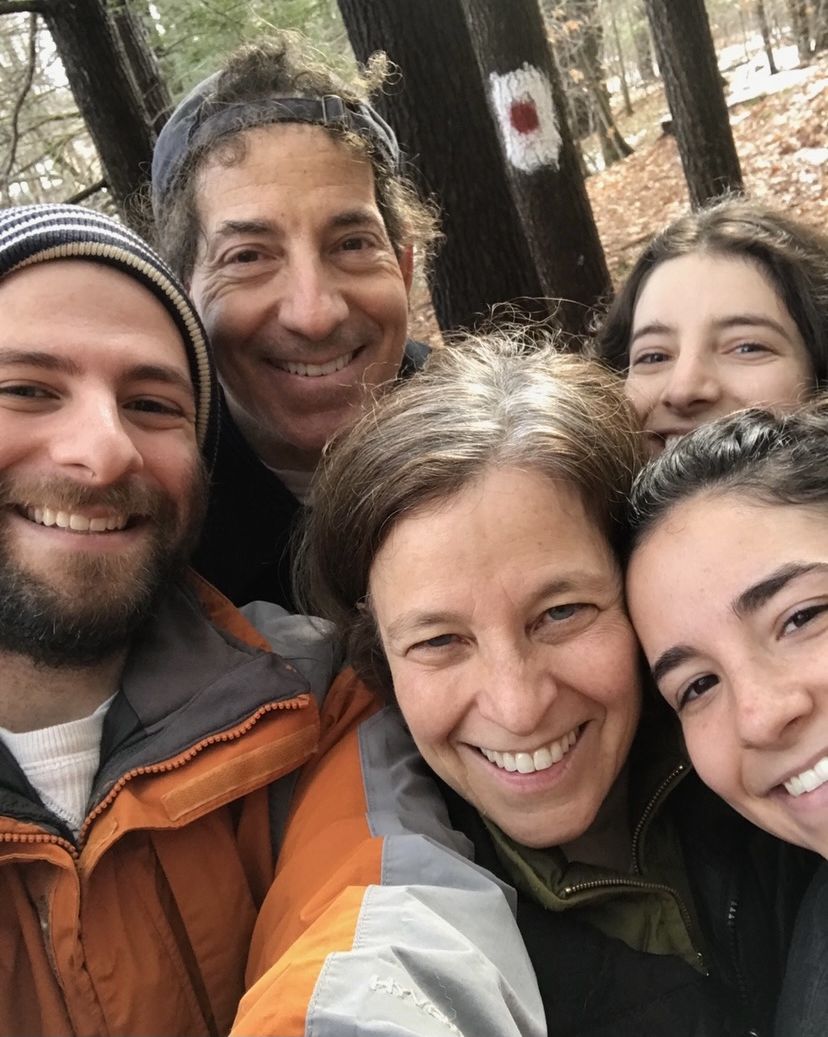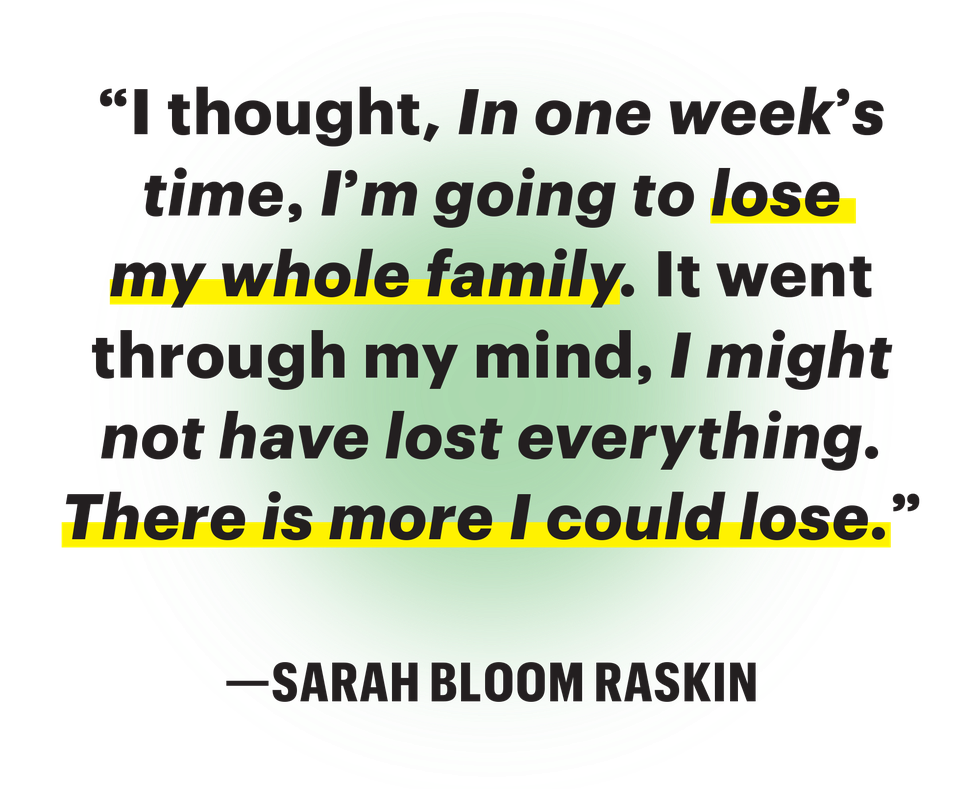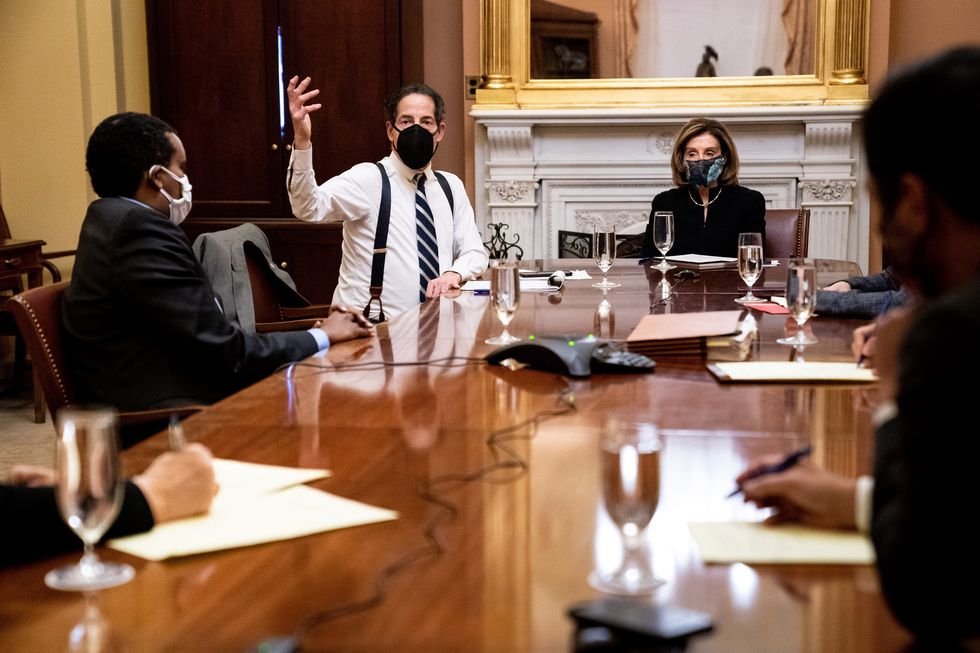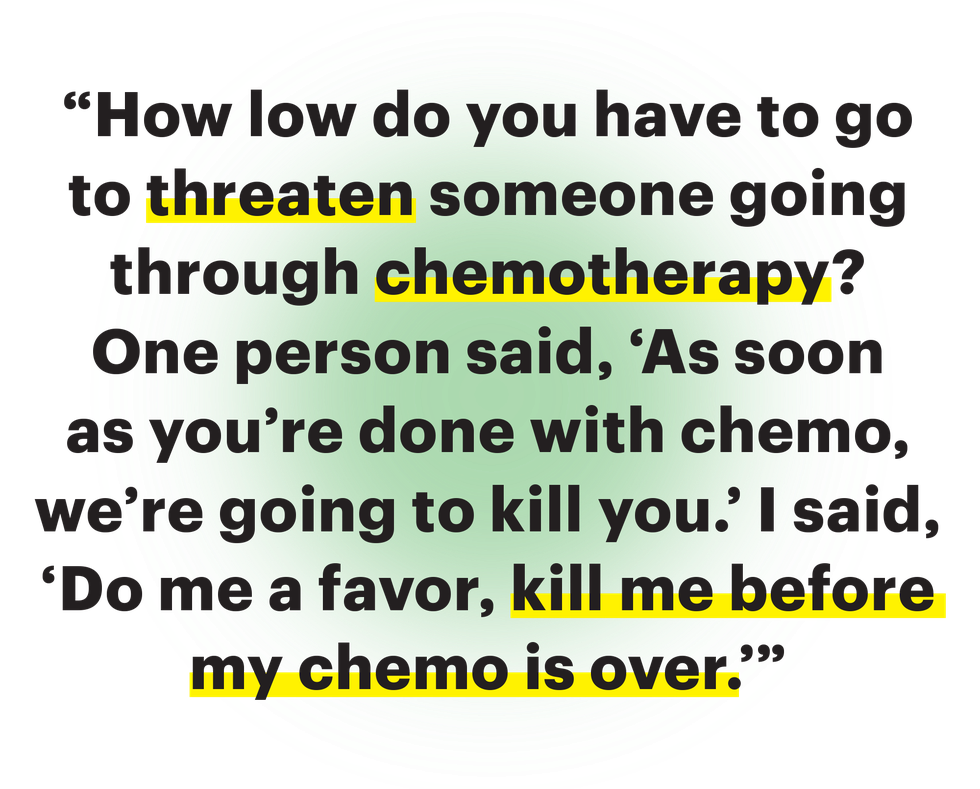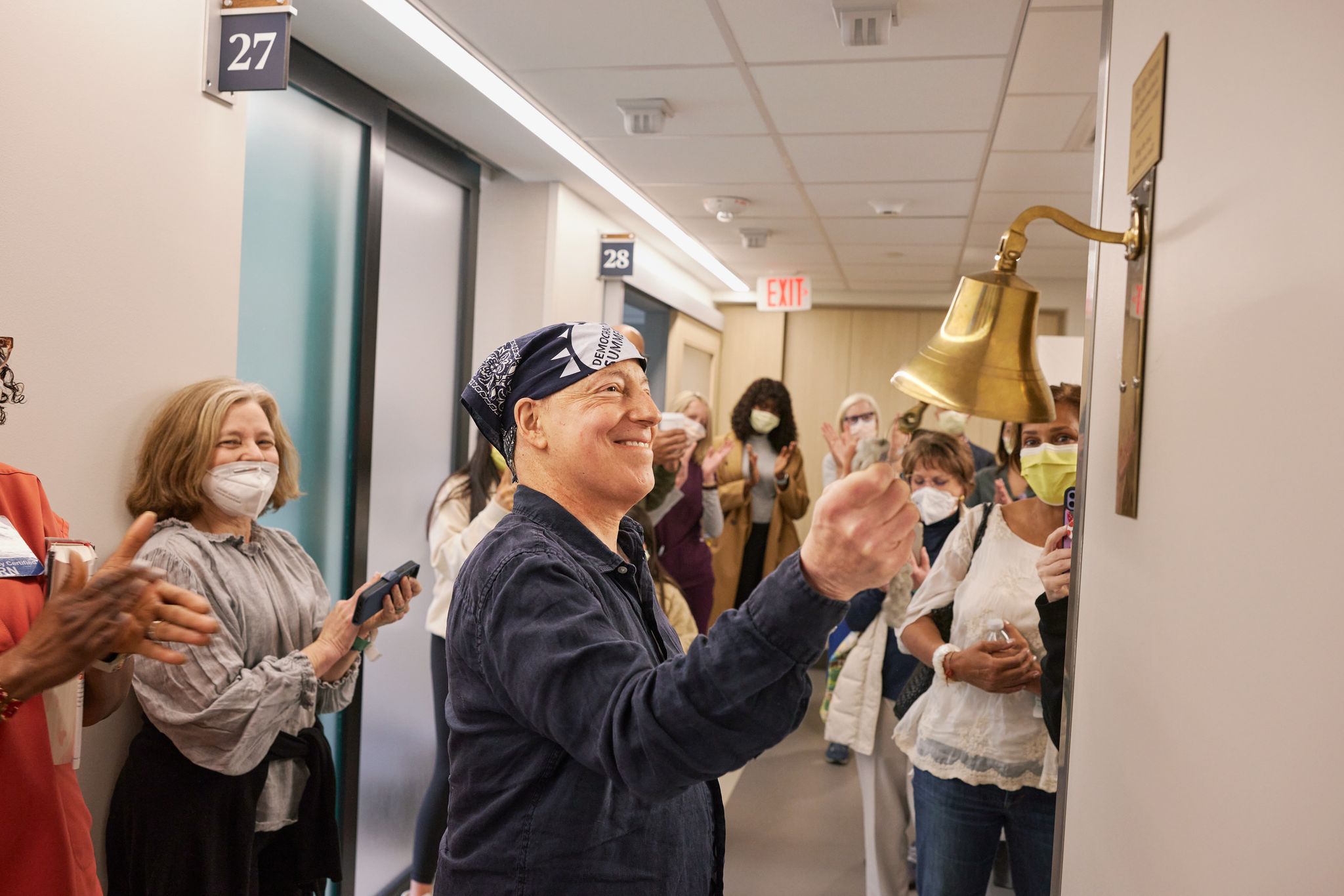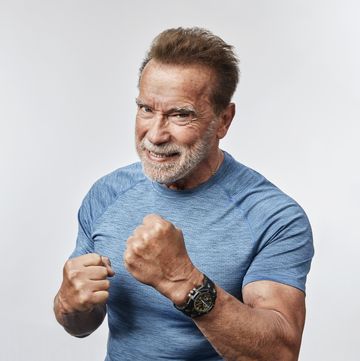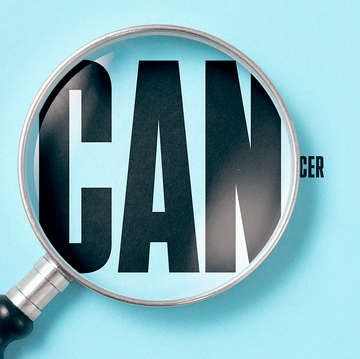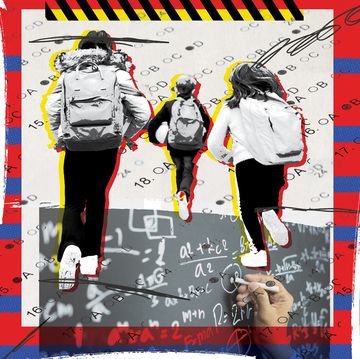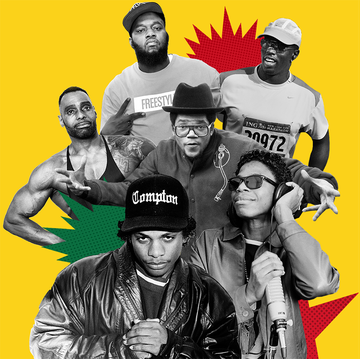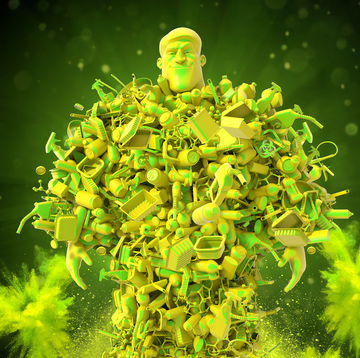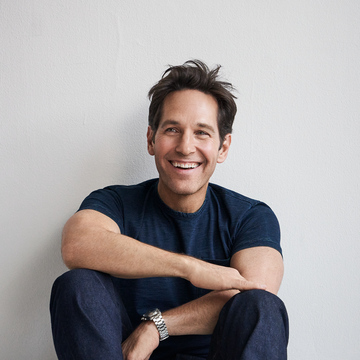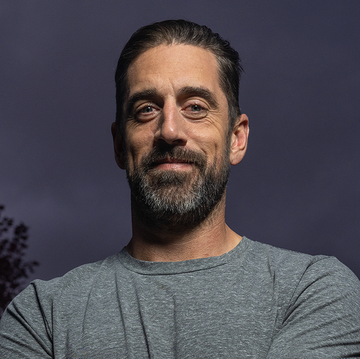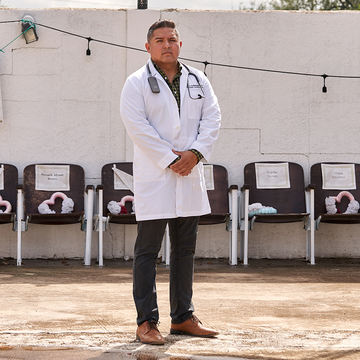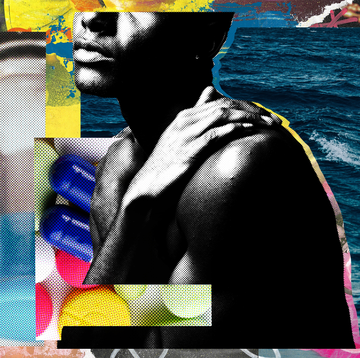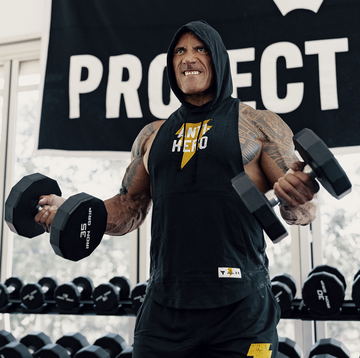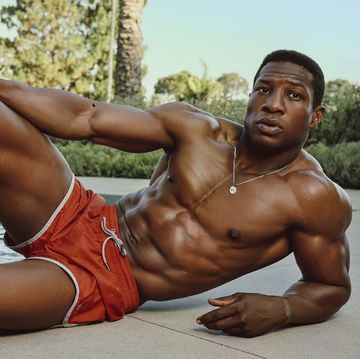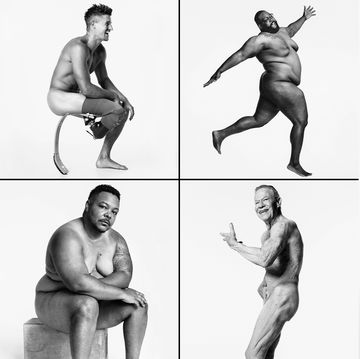IT'S JUST AFTER 7:00 a.m. on a Friday morning in March, and Representative Jamie Raskin has decided that he wants to drive himself to chemotherapy. Once he starts his “five-drug chemo cocktail,” he won’t be able to operate a vehicle for days. This is his chance. With his hands on the steering wheel at ten and two, he glides through the green lights on Nebraska Avenue in downtown D.C., 25 minutes away from his home in Maryland. He passes rows of cherry blossoms and makes a right into the parking garage of Georgetown University Hospital.
Absent is the buttoned-up attire one typically associates with a member of Congress. He’s not exactly wearing pajamas, but he’s certainly not wearing the navy blue suit he had on when I saw him the week before. A leopard-print bandanna (a gift from Steven Van Zandt—yes, Little Steven) covers his head, now bald from the chemo.
After discovering a “Schwarzenegger sized” mass on his neck at the end of last year, Raskin, now 60, was diagnosed with stage 2 diffuse large B-cell lymphoma—a very serious but curable form of cancer. (“Triple hit, which means it’s a little more resilient,” he adds.) In this case, curable means six rounds of chemo, each round lasting five days.
The mood in the car is not somber. Not at all. In fact, Raskin is a turbine of wit; he’s funny and energetic. He confesses that he fell asleep watching Succession—a show he loves—the night before. This is perhaps unusual for a guy who’s been through unimaginable trauma over the past few years. But unlike the life-changing events that have unfolded, today there’s no surprise. He knows what’s coming.
For the next three to four hours, he’ll sit in a private treatment room—a room he says is so sparse he’s told the nurses he may soon show up with campaign posters to decorate the walls—where he’ll get plugged into a machine that will begin the drip of cancer-killing drugs into his body and start what he calls a “week or two of chemo hell.” To pass the time, he’s brought a book to read (a biography called G-Man: J. Edgar Hoover and the Making of the American Century) and some work to do (he hasn’t missed a vote or hearing since his diagnosis).
After that, he’ll leave the hospital, but he’s not done. For the better part of a week, he’ll remain connected to a pump, tucked into a little backpack he can wear over his shoulder, that will allow him to continue his treatment from home, save for the daily trips he has to make back to the hospital to refill the pump with drugs. This course of treatment is different from the one he had when he was diagnosed with stage 3 colon cancer in 2009. Then he had to have two surgeries, chemo, and radiation, all requiring significant time in the hospital.
Home or not, the effects of chemo are grueling. He tells me it turns his tongue the flavor of tin. It makes his nerve endings sensitive enough that he struggles to button a shirt. It causes a dramatic loss of appetite. It makes him tired. It long ago took his hair, and recently his eyelashes have started to fall out. This should elicit complaints from Raskin.
It does not. Trying to get him to harp on the difficulties of his situation is like trying to nail Jell-O to a wall. There are no twangs of self-pity in his voice. He speaks openly and easily about the realities of having cancer.
“I’m pathologically optimistic,” he says. “I’m surrounded by a lot of wonderful people in my life. I think, a lot of times, about people who go through cancer without a lot of love and support, and it makes me terribly sad, but that’s not my situation.”
Indeed, there is a remarkably long roster of people ready to drive Raskin to treatment, to cook for him, to keep him company, to do whatever he needs. An incomplete list: his wife, his daughters, his big sister, his little sister, his brother, friends, neighbors, and colleagues. Once, Representative Alexandria Ocasio-Cortez dropped by his house with freshly squeezed orange juice in the weeks after he was first diagnosed.
When Raskin was first diagnosed matters. It was December 2022. December. Raskin began chemo on December 31. The exact day, two years earlier, that his 25-year-old son, Tommy, had died. A loss so enormous and devastating one couldn’t possibly have fathomed what more could—and would—come in the days and months ahead: an insurrection, contentious impeachment hearings, death threats, a demanding course of chemotherapy. Swimming in an ocean of grief as each event unfolded, it’s a wonder how Raskin kept his head above water.
THE LAST NIGHT Tommy Raskin spent alive, he was with his dad. The rest of the family was spun across the country, visiting family, finishing up work. Raskin and Tommy had dinner. They watched Family Guy and talked about Tommy’s upcoming spring classes at Harvard Law and made plans to go on a hike the next day. They considered watching something else, an old debate on the Iraq war, but Tommy was tired, so Raskin gave him a hug, told him he loved him, and that was that. Everything seemed fine.
But it wasn’t. In high school, “depression found Tommy,” and it grew more serious during his college years. His family was supportive, he had access to good doctors, and they believed it was under control. It was not. The next morning, Raskin was making himself and his son peanut-butter-banana smoothies for breakfast. When they were ready, he called out to Tommy, yelling, “Tombo!” No answer. Raskin went downstairs to his son’s bedroom and found Tommy’s body. He died by suicide. Police later discovered a farewell note written on the back of an old Boggle word sheet (Tommy’s favorite game):
“Please forgive me.
My illness won today.
Look after each other, the animals, and the global poor for me.
All my love,
Tommy”
In his book, Unthinkable: Trauma, Truth, and the Trials of American Democracy (2022), Raskin writes: “After searching frantically for my phone—which I had thrown high in the air when I came upon the scene—after dialing 911 and screaming; after I tried to resuscitate him and get him to breathe by pressing repeatedly on his hard, beautiful chest; after speaking to the Takoma Park Police who arrived; after the first few hours of time freeze and shock; after speaking words from my mouth on the phone to my wife and two daughters . . . I floated through the house and under the grey, winter sky, thinking perhaps I was gone forever, too, and then I sat concretely traumatized and catatonic in my T-shirt and sweatpants and my ‘Democracy Summer’ baseball cap, rocking back and forth like a baby, like my own baby son I held twenty-five years ago.”
In the days that followed Tommy’s death, Raskin and his wife, Sarah Bloom Raskin, sat down to write a public statement. Drafts were written on their phones and shared back and forth with each other. At least, this is probably how it happened, Sarah tells me on a phone call in April, her voice friendly and warm. It’s hard to remember exactly. That time is such a blur.
As she explains it, “We were missing Tommy; we had to put a form to it. I don’t know how we summoned the strength to pull together those words. We were able to draw a picture of him that was so vivid because we had lost him so quickly. He was still with us.”
They published the statement on Medium four days after Tommy’s death. If you haven’t read it, you should. It can best be described as . . . what? As something incandescent. It doesn’t resurrect Tommy; that’s the kind of magical thinking Raskin doesn’t indulge in. But with every line, you can see and feel more of him. A beautiful, happy life, if too short of one.
In some ways, it introduced America to Raskin, too. People outside of politics and from all across the country wrote to him and shared their own stories of loss and grief and mental illness.
The first time I ask Raskin about Tommy—his middle child, his only son, his “dear boy”—we’re sitting on the porch of his home in Takoma Park, Maryland. The same house where Tommy grew up and, awfully, took his last breath. In the soft, banana light of spring, Raskin’s wound becomes immediately visible. He looks down toward the ground, tears arriving before the words do.
After a long silence, he tells me that Tommy’s presence has been with him, including when he began chemo. “Cancer, it tests your will to live,” he says. His voice, which typically carries an upbeat cadence, becomes strained; he crumples a mask he’s been holding in his hand into a ball. “You have to fight in this process. I’ve felt Tommy very much with me through the whole thing. . . . It was a soulful and meaningful thing to start this journey on that day and to feel Tommy was with me as I resolved to get through this.”
What does it mean to feel Tommy with him?
It feels like when he breathes that the very oxygen going into his lungs is given to him by his son.
The next couple times I speak with Raskin, whenever I bring up Tommy, there is never a time his grief doesn’t heave to the surface and wobble out in tears—that it doesn’t send him to a removed place, one seemingly without air. Standing in his living room, looking through a shoebox full of photos of Tommy, he can say little more than “I think about Tommy all the time.” The words gum in his throat, and he puts his fist over his heart. And so we look at the pictures without saying much of anything: There’s Tommy as a little kid, with his “madcap curly hair,” standing in front of a case of pastries. There’s Tommy at ten holding a microphone, giving a speech at one of his dad’s political events. There’s Tommy as a baby, his dad lifting him high in the air, all pride and joy and wonder.
He replays over and over and over what he could have done differently. “No matter how someone is lost, the family is left with an abundance of questions about what might have been done,” says Raskin. What if he had asked Tommy if he was thinking about hurting himself? What if he had used the word suicide? “I think I operated like a lot of parents do, thinking that not mentioning the word was safer, because if you mention it, somehow it conjures up the reality,” he says. “But it’s really quite the reverse. If you don’t mention it, it invests it with a lot more mystery than it would otherwise have.”
JAMIE RASKIN WAS born in Washington, D.C., to Barbara Raskin, a journalist and novelist, and Marcus Raskin, a former aide within the Kennedy administration, a professor at George Washington University, and a political philosopher (politics clearly always in Raskin’s orbit). He’s one of four children. After graduating from high school at 16, Raskin went on to attend Harvard College and then Harvard Law. He became a constitutional-law professor at American University’s Washington College of Law and married Sarah, an attorney who later served as deputy secretary of the Treasury. They had three children: Tabitha, Tommy, and Hannah. In 2006, Raskin, a Democrat, decided to run for the state senate in Maryland, a place he loves so much, he tells me he’d be perfectly content to “never leave the Eighth Congressional District.” During that time, he voted to repeal the death penalty, led the fight to legalize same-sex marriage, and fought to reform marijuana laws.
“I suppose I tend to idealize that time frame, but I had not one but two great jobs I loved,” he says, referring to his work as a law professor and a state senator. “And then I got elected to Congress [in 2016], which of course would ordinarily be this great, triumphant thing, and a great excitement, and yet Trump was elected, and it seemed like everything in life turned in a dark direction.”
Which is how, just 24 hours after Raskin buried his son, he found himself going to work as a U. S. congressman to certify the results of the 2020 election and carry out his duty to assist in the peaceful transfer of power. It was January 6, 2021.
“There was no way I wasn’t going,” he tells me. “As gloomy and morose a period as it was for us, I just knew I had to be there.” His family was less sure, urging him to stay home, but after it was resolved that he would attend, his daughter Tabitha and his son-in-law Hank decided to accompany him.
An hour into the proceedings, shortly after he thanked his colleagues for their love and support and got a standing ovation, he received a text message asking if he was safe. The message came from actress Alyssa Milano, a friend whom he met in 2019 after she gave a speech about the Equal Rights Amendment. Reports began to funnel in of police officers getting punched, of the Capitol being breached, of Confederate flags flying in the building. Separated from his family, Raskin texted his chief of staff, Julie, and told her to guard Tabitha and Hank with her life. They barricaded themselves in an office and hid under a desk. Julie stood guard near the door with a fire poker.
At home, Sarah tells me she watched everything unfold on television in horror. “I thought, In one week’s time, I’m going to lose my whole family,” she says. “It went through my mind, I might not have lost everything. There is more I could lose.”
Raskin felt something different. “I was not experiencing fear, and it was because I felt like I’d already lost what was most precious to me in the world, Tommy, and I felt like there was nothing that these hooligans or traitors could do that would be worse than that.”
What he did experience was outrage. “I had a rising sense of anger and determination to figure out exactly how all of this happened and to make sure it never happened again.” He got his chance when, on January 12, he received a call from then Speaker of the House Nancy Pelosi. First, she asked him about his family, and then she asked him to lead the impeachment hearings against Donald Trump. He had every justification to say no, to collapse into his grief. But of course he said yes.
He calls the opportunity a “lifeline.” He channeled everything he had into those hearings in the grievous weeks that followed, both as a father in mourning and as an American. Naturally, it didn’t always make him popular. Just recently he received 13 death threats. “How low do you have to go to threaten someone going through chemotherapy?” says Raskin with a half grin. “One person said, ‘As soon as you’re done with chemo, we’re going to kill you.’ I said, ‘Do me a favor, kill me before my chemo is over.’”
There it is again. What seems to be Raskin’s own personal brand of humor and defiant resilience and unwavering optimism. Words that came up often, in various ways, with nearly everyone I spoke to.
Representative Alexandria Ocasio-Cortez, a Democrat from New York, tells me: “He’s just outrageously clever; he’s clever in his humor, in his legislative work, which he’s profoundly committed to. He has a relentless optimism.”
Representative Nancy Mace, a Republican from South Carolina, tells me: “He’s a fighter. He’s always had a lot of energy and is full of life and character. He’s someone who has so much vibrance. That just hasn’t changed.”
Jennifer Lord, a self-described “conservative, Republican, fundamentalist Fox News junkie” from Texas and Raskin’s good friend, who sometimes drives him to chemo, texts me: “Jamie’s resilience, kindness, and optimism for the future hasn’t slowed at all in the face of tragedy; his commitment and drive have only gotten stronger.”
But how? How do you find hope? How do you walk through the world when you know how porous the boundary is between good and terrible? How do you find your way out from under the blast radius of trauma?
Sarah says that as a family, they are healing in their own ways and in their own times. They’re on a path that is long, and likely never-ending. “If grief is love after death, then you’ll grieve forever because you’ll love that person forever.”
Raskin sees a grief therapist when he has the time. It’s nice to have someone to talk to, but he’s mostly not concerned with his mental health. As Raskin puts it, “We all have to pay our dues in different ways,” but he’s lucky to have been born with what those around him describe as rose-colored glasses.
“I can’t say that if you lose a child and you have a second cancer diagnosis that you are going to be the same,” says Sarah. “If you were, something might be wrong with you. But he has always been constitutionally strong and extremely optimistic. He does not yield to despair.”
Though Raskin identifies religiously as Jewish, philosophically he considers himself a humanist—subscribing to the idea that people have the responsibility to give meaning and shape to their own lives—which has helped guide him in the face of adversity. “They give you some things and they take other things away,” Raskin says. “My dad once told me that you can have a first-class mind, a first-class body, and a first-class spirit, but it’s very tough for anybody to have all three.”
Accidentally, and mortifyingly, I FaceTimed Raskin while he was in the middle of chemo. A fact I knew—and he knew I knew—because we had just gotten off the phone an hour earlier. Shortly after, I got a text from him that was peppy and gracious and made me feel less bad.
Later, I tell this story to Sarah, and she says something that crystallizes Raskin’s buoyancy for me. “I don’t think he cared,” she says. “As public as we were about Tommy, that is how public Jamie is being about going through lymphoma. I didn’t need everyone in the world to read our statement. I might have been fine without a statement. It felt like a private loss. But Jamie saw it as wanting to share. I think he’s doing that again.
“Seeing Jamie having lost his hair, his eyelashes, wearing a bandanna, I think it gives strength to people who are themselves going through chemotherapy. My hope is that in some small way, this approach is destigmatizing and humanizing so much of what loss is. When we break down what optimism is—it really is that he’s taking a leap of faith and sharing his losses publicly.”
BACK IN TAKOMA Park, a quilt on Raskin’s lap to keep him warm, he tells me that his prognosis is good, and this is a guy who deserves good news. After Raskin’s third round of chemotherapy, his large mass disappeared. A PET scan confirmed it. His doctor was amazed.
I still wonder, though: How is he really doing? I bring up the sociologist Erving Goffman to him. Goffman pioneered the concept of the frontstage and backstage selves. People in the public eye, especially politicians, are wizards at the frontstage self. But the backstage self—it’s raw and vulnerable and not quite polished enough to deliver searing diatribes on the House floor.
How is that guy doing, the backstage guy? I ask.
“My frontstage self is filled with boundless optimism for America and for the future of people. We have the power within us to get through the darkness of our times and to remake America,” he says, waving to a pair of neighbors as they walk by. “My backstage self is filled with a lot of worry for young people and the future that they could inherit if we don’t do our jobs right.”
It’s a frontstage answer. But it does go back to how Raskin has been able to cope: He finds a lot of purpose and conviction in his work. In the past few years, he’s been focused on increasing funding for school-based mental-health programs and the national 988 Suicide & Crisis Lifeline. “When you compare the military budget, which is over $800 billion, it’s astonishing how [little] we put into mental and physical health care,” he says. “And yet health care is really all about the defense of our people and building a strong society. And so we need to think about this as essential to our national security.”
There are, of course, a lot of other things he’s working on and will continue to work on. Raskin tells me he has no plans to retire. “At some point, I’ll just go and play with all of the little kids in our family and my future grandchildren,” he says.
It’s true that he finds great comfort in the robust support system around him. At one point, he tells me about a time last summer when he gathered dozens of family members and took them to a summer camp on the Chesapeake—the same one he went to as a kid. They did a ropes course and played capture the flag and tossed a football around. See, he can be a “playaholic,” he says with a smile that makes it look as if he’s swallowed the sun. But for now “I am 1,000 percent committed to the struggle to defend our freedom and democracy,” he says. “I’m not going anywhere until I feel like our politics, our government, our society, are safe for future generations of Americans. I just feel that’s my personal imperative.”
In that way, Raskin’s healing seems less about himself and more about everyone else. The country, the people he loves, the grandchildren he may one day have. “Look after each other,” Tommy wrote. His dad sure is trying.
If you or someone you know is having suicidal thoughts, contact the Suicide & Crisis Lifeline by dialing 988 for free and confidential support.
This article originally appeared in the July/August issue of Men's Health.
